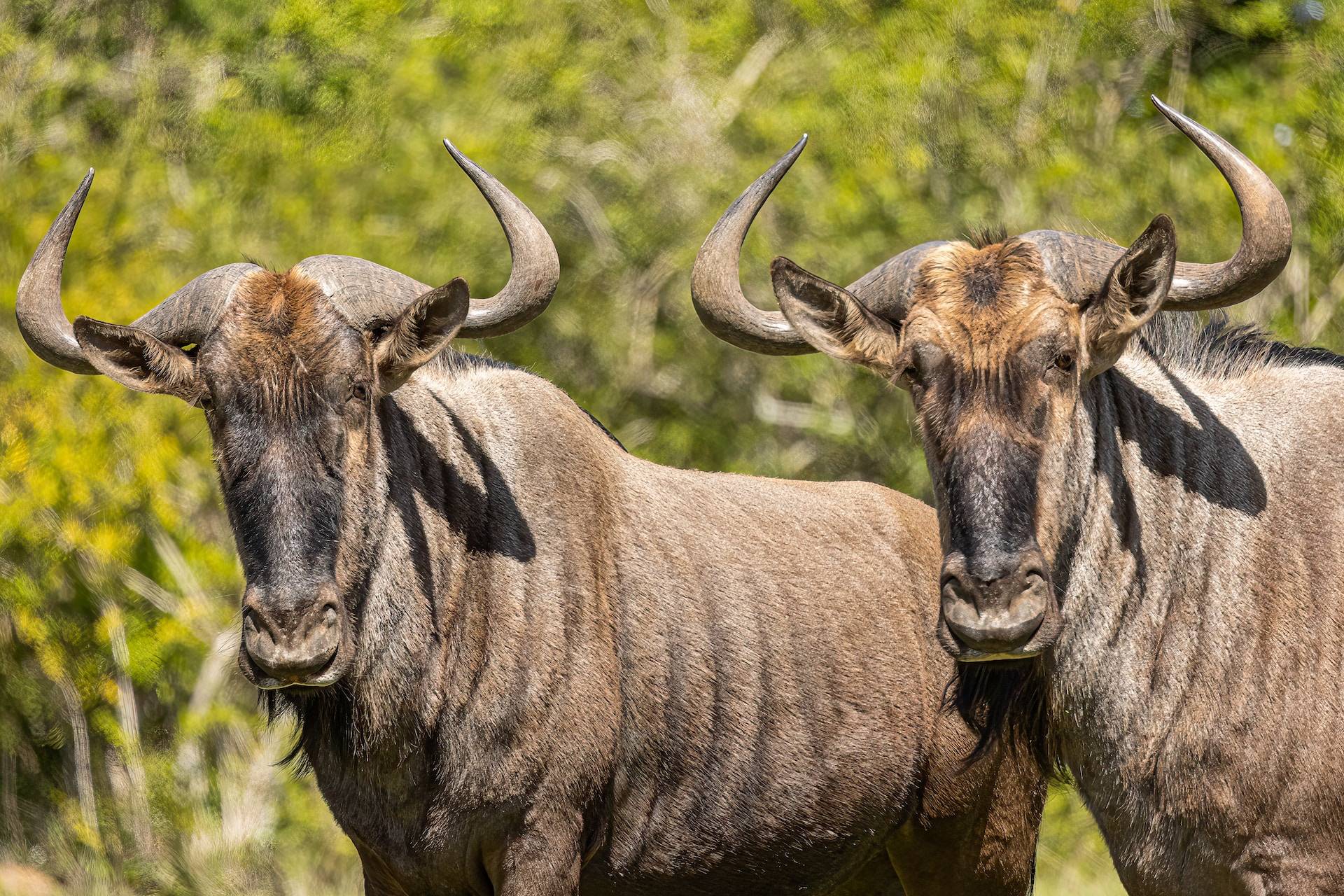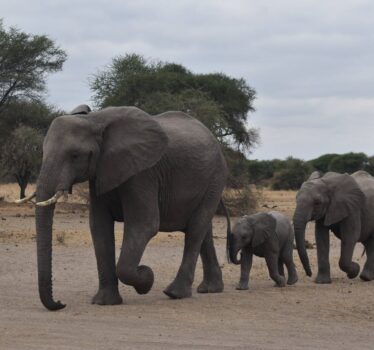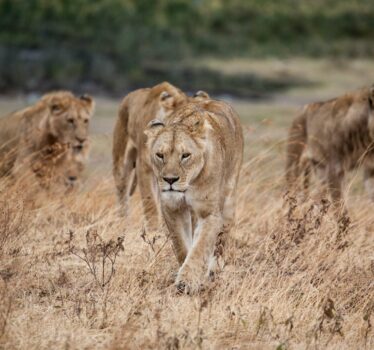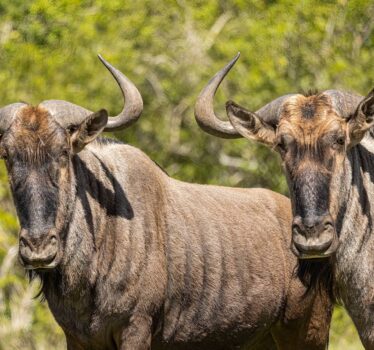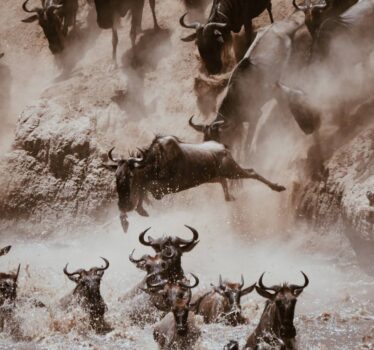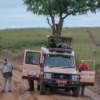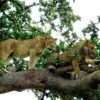Northern Tanzania Calving Season
Northern Tanzania Calving Season
Overview
Encounter the large wildebeest herds grazing on the nutrient-rich plains of southern Serengeti between January to March. February marks the peak of the wildebeest calving season – witness how a new generation is born and takes their first steps! Of course, this event attracts a wide variety of big cats with predators in action all over the plains! An incredible event not to be missed!
Trip Highlights
- Witness the annual wildebeest calving in Ndutu Area between January and March.
- Explore the vast and diverse wildlife of Serengeti National Park, including the Big Five.
- Enjoy a game drive in the Ngorongoro Crater, home to lions, elephants, rhinos, and other wildlife.
- Take part in spectacular bird watching in Lake Manyara National Park.
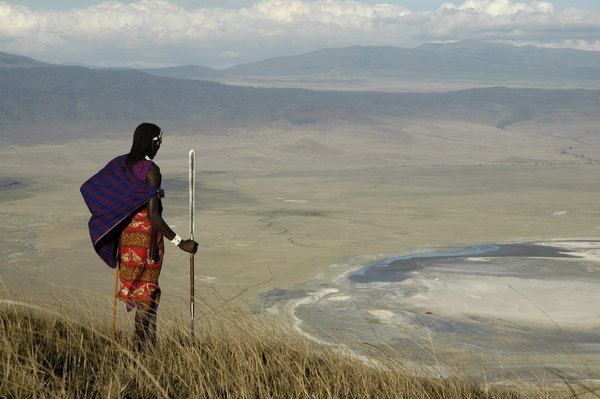
Information
Trip Info
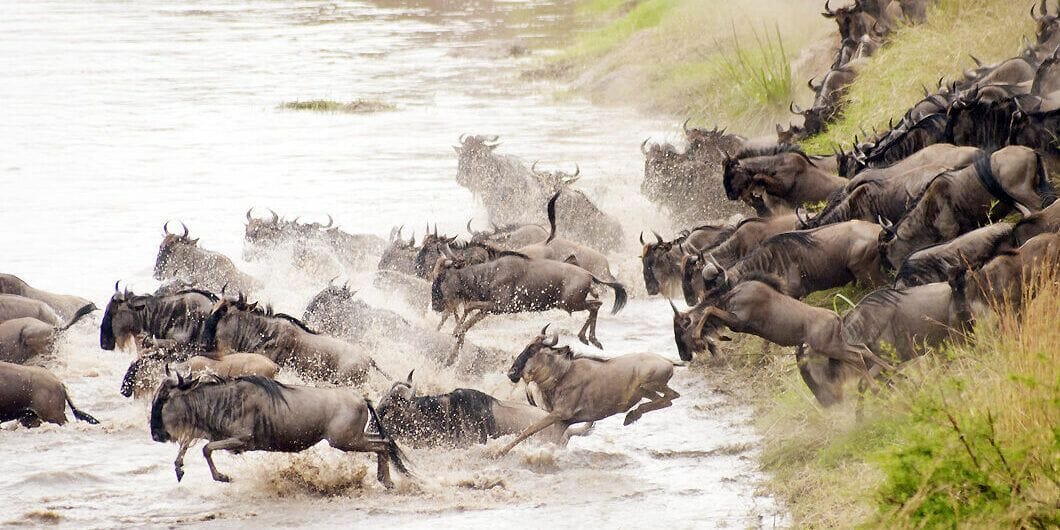
Serengeti National Park
Witness the Great Migration and iconic African wildlife in vast savanna plains.
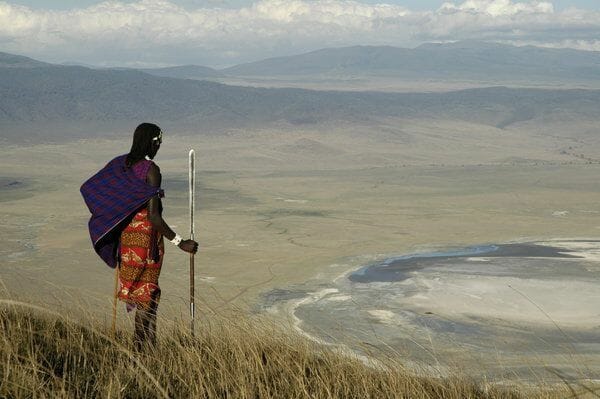
Ngorongoro Conservation Area
Descend into the world’s largest unbroken caldera for epic wildlife viewing.
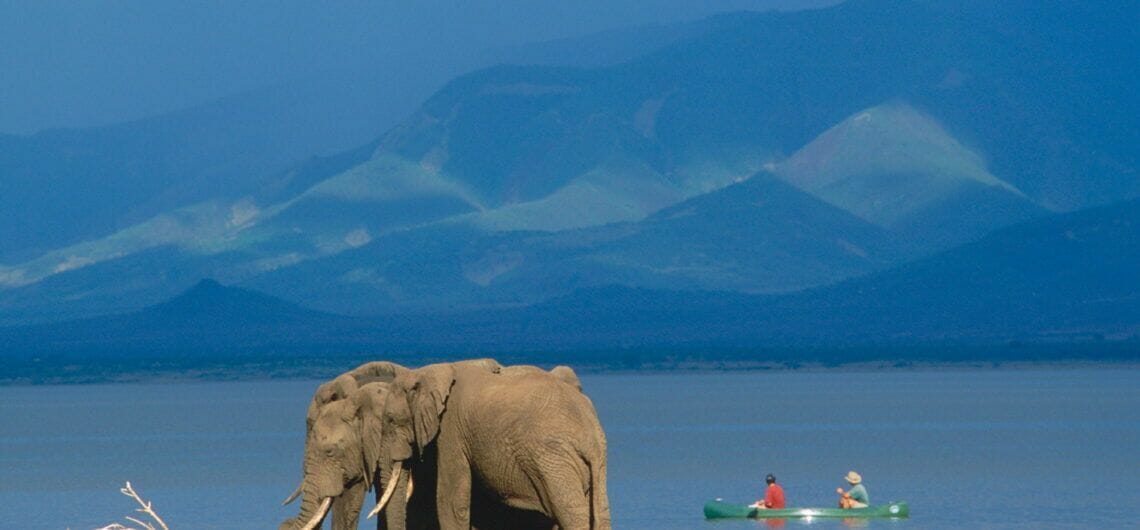
Lake Manyara National Park
See flamingos and tree-climbing lions on a scenic safari drive.
Dry Season in Tanzania – June to October
During this time, the weather is generally dry, with little to no rainfall (between 15mm – 36mm per month). The average temperatures range from 20°C to 30°C (68°F to 86°F), making it a popular time for wildlife safaris and visits. The dry season is also ideal for witnessing the Great Migration, as herds of wildebeest and other animals migrate across the plains.
Wet Season in Tanzania – November to May
The peak of rainfall is typically in March (178mm / 7”), April (368mm / 14.5”), and May (211mm / 8.3”). The wet season is characterized by intermittent showers and occasional heavy downpours. Average temperatures during this time range from 20°C to 28°C (68°F to 82°F). The landscapes become lush and green, offering beautiful scenery and opportunities for birdwatching. However, it’s important to note that some roads and trails may become impassable due to muddy conditions.
Best Times To Spot Wildlife in Tanzania
As one of the best game viewing countries on the continent, Tanzania offers year-round opportunities for seeing some of Africa’s most impressive animals.
For the Great Serengeti Migration: head to Southeastern Serengeti from December through April, Western Serengeti and Grumeti from May through July, and Northern Serengeti from July through November.
For other wildlife in Tanzania, December through January is equally great for Lake Mantra and Ngorongoro, while July through November is excellent for Ngorongoro, Tarangire, Selous, Ruaha, Mahale, Gombe, Katavi.
Itinerary
Trip Itinerary
Lake Manyara National Park
- Tanzania
Meet & Greet in Arusha with your professional driver/guide. Drive to Manyara National Park – located directly along the Rift Valley. The park is squeezed in between the steep sloping Rift Valley Wall and the shallow, alkaline soda lake. The dry season from June to October is best for viewing large mammals such as elephants, giraffes, zebras and cats; while the wet season, from November to May, is ideal to spot birds. Proceed to your accommodation.
- Rift Valley Photographic Lodge
"Ngorongoro / Ndutu "
- Tanzania
After breakfast proceed to Karatu and onwards to the entrance gate of the Ngorongoro Conservation Area. Your drive leads you to Ndutu Area which is considered in many aspects as the continuation of the seemingly endless plains of southern Serengeti. Spend the next two days on game drive – always in search of the large wildebeest herds who graze on the short-grass plains of Ndutu.
Between January and March, Ndutu is the perfect place to witness one of the greatest spectacles on earth! Depending on the rains the wildebeest cows will give birth simultaneously with almost 8,000 calves being born each day. It is also a feast for predators that target the young and weak. An incredible experience to be part of and not to be missed!
- Ndutu Safari Lodge
Serengeti National Park – Central
- Tanzania
Road journey to Serengeti National Park with picnic-lunch. Serengeti is Tanzania’s most famous national park and was designated as a UNESCO World Heritage site in 1981. Game viewing is fantastic throughout the year with resident game including buffalos, cheetahs, crocodiles, elephants, giraffes, hippos, hyenas, leopards, lions, servals, warthogs, wildebeests, zebras and many more!
- Baobab Serengeti Camp
Ngorongoro Crater
- Tanzania
Departure with picnic-lunch to Ngorongoro Crater for game drive. The Ngorongoro Crater is an intact volcanic caldera and a natural sanctuary for wildlife. Expect to encounter prides of lions, elephants with huge tusks due to the rich volcanic soil, plain game, hippos, birds and many more. With a little luck you might spot the highly endangered black rhinoceros. Proceed to your overnight stay.
- Marera Valley
Return to Arusha
- Tanzania
Return to Arusha with drop-off according to your travel journey – either in Arusha Town or at Arusha Airport (ARK) / Kilimanjaro International Airport (JRO).
The Beauty of Africa
Gallery
The Beauty of Africa
Gallery
Itinerary
Trip Details
Inclusions
- Accommodation
- Full Board Safari incl. extra picnic-lunch on day 1 and water in the Safari Vehicle
- 4x4 customized Safari Vehicle
- Professional English-Speaking Driver/Guide
- Park Entrance Fees: for game drives in Manyara NP, Serengeti NP & NCA Ndutu & Crater
- Trip Safety: AMREF Flying Doctor Emergency Evacuation Insurance; 24/7 Service Support
- Government Taxes: Value Added Tax at 18%, Tourism Development Levy
Exclusions
- International flights
- Airport taxes
- All meals and drinks not specified
- Personal expenses (laundry, etc.)
- Tips and gratuities
Prices
-
2 pax based on a double room $4,390/person
-
4 pax based on 2 double rooms $3,915/person
-
6 pax based on 3 double rooms $3,760/person
Our tailor-made trips are designed to offer you the best possible value to make your East African safari experience a memorable one. As a boutique tour operator, we are happy to personalise your trip budget and package according to your needs.
Please treat all pricing as a guide only, as customisations made to this itinerary, style of travel, and number of guests may raise or lower the overall cost. All rates are subject to availability and may change without notice. Single supplements may apply.
For the best, most current rates available, request a quote or speak to one of Kikooko Africa Safari’s travel experts.

Warren Anwkasa,
Founder, Kikooko Africa Safaris
Inquire About This Tour
All our itineraries can be adapted to suit your personal interests and preferences.
Please feel free to discuss these with us so we can personalise your tour for your maximum enjoyment.
For the most current rates for your party, request a quote or speak to one of Kikooko Africa Safari’s travel experts.
Inquire About This Tour

Warren Anwkasa,
Founder, Kikooko Africa Safaris
All our itineraries can be adapted to suit your personal interests and preferences.
Please feel free to discuss these with us so we can personalise your tour for your maximum enjoyment.
For the most current rates for your party, request a quote or speak to one of Kikooko Africa Safari’s travel experts.
What Our Guests Say
Verified Uganda by Kikooko - a unique experience Uganda's tourist potential is vast and to a large degree unspoilt. Kikooko as a whole and our tour guide Alex in particular gave us a truly unforgettable insight into the wonders of this amazing country. We were treated as friends and got to see the amazing variety of flora and fauna, enjoyed great places to stay and eat and, above all, experienced the friendliness of the Ugandan people. Every detail of our journey was perfectly planned and organized, and Alex displayed his passion for his profession and the country. Great experience, excellent service, passionate people!Verified Safari Company with heart and soul I met the founder of Kikooko at the travel fair in Zurich and told him about my dreams of Uganda and the Gorillas. He arranged a wonderful overland journey for me that was filled with activities around wildlife and culture. The driver-guide was friendly and professional, his knowledge and helpfulness great. I could just relax and feel safe and comfortable allover the country. Also traveling alone as a woman was no problem at all. People in Uganda are friendly and openhearted. Most of the lodges that were chosen for me were situated at beautiful spots and with delicous food. I can highly recommand KIKOOKO as a professional, trustworthy Safari Company with heart and soul. January 24 / Claudia FauserVerified Es gab so vieles zu entdecken und Neues zu lernen. Es war Abenteuer pur! Die Reiseplanung mit Warren erfolgte per Mail. Die geplante Reise dauerte 3,5 Wochen und beinhaltete eine Rundreise von Entebbe zum Kidepo Valley National Park, zu den Gorillas im Bwindi Impenetrable Park bis zum Queen Elizabeth Park und zurück nach Entebbe. Auf Wünsche und Änderungen gingen das Kikooko Team immer ein und machten diverse Abklärungen. Die ganze Planung ging sehr gut und nicht stressig auf. Das Programm war voll mit sehr schönen Abenteuern und Begegnungen, sowohl mit den Tieren als auch mit den Menschen und ihren Kulturen. Die Menschen sind sehr freundlich und hilfsbereit. Sehr beeindruckend fand ich, dass immer sehr freundlich gegrüsst und zugewunken wurde! Kinder riefen und winkten am Strassenrand, teilweise rannten sie uns nach. In diesen 3 Wochen versuchte ich einzelne Wörter zu lernen, da war Ivan ein guter Lehrer, aber es ist eine sehr schwierige Sprache! Ich lernte sehr viel über dieses Land. Während der Reise fühlte ich mich immer sehr gut aufgehoben und sicher. Allein als Frau zu reisen, ist kein Problem. Ivan war ein sehr guter Guide, weiss sehr viel über die Tierwelt und schätzt Situationen gut und sicher ein. Er hat einen sehr angenehmen Fahrstil und umsorgte mich sehr. Ich konnte mir für die Fotografie sehr viel Zeit nehmen und ging immer auf meine Bedürfnisse ein. Lodges: die verschiedenen Lodges waren gut ausgestattet und sauber. WLAN war vorhanden, aber war tw. sehr langsam, je nach Wetter. Bei Dunkelheit wurde man in gewissen Lodges, dort wo Grosstiere wie Nashörner, Hippos, Elefanten oder Löwen zu Hause sind, zur Sicherheit ins Zimmer begleitet. Auto: es ist ein stabiles Auto und hatte diverse schwierige Strassen gut gemeistert (natürlich auch mit den perfekten Fahrkünsten von Ivan!). Ivan hatte es immer sehr sauber gehalten und geputzt. Das Dach liess sich anheben, damit man einen sehr guten Rundumblick hatte und perfekt fotografieren konnte. WLAN wurde kostenlos angeboten, was ich so noch nie gesehen habe. Gerade bei längeren Fahrten konnte man zu Hause ein Update geben und ein paar "Bilderkostproben" im Status hochladen. Handy laden im Auto ist mit Ladekabel und Adapter möglich! Wasser ist jederzeit abfüllbar im Auto parat, dazu wurde am Anfang der Reise von Warren eine Wasserflasche geschenkt, was ein super sinnvolles Geschenk und Erinnerung ist. Süssgetränke, Bier usw. ist alles da. Geld: Schilling lässt sich bei der Ankunft wechseln und Ivan schaut auch, wo der beste Kurs ist. 200 Dollar habe ich gewechselt, aber es ist kein Problem, mit Dollar, Euro oder sogar mit CHF zu bezahlen. Kreditkarten kann leider nur an wenigen Orten verwendet werden. Für jede Leistung von Guides usw. sollte man Trinkgeld gegeben. Es gibt keine ungefähre Definition, wie viel man mindestens geben sollte, denn man gibt, was man möchte. Wenn man sehr zufrieden ist, dann gibt man entsprechend. Das macht es sehr schwierig. Fotografie: die Stromversorgung in den Lodges waren immer gut und alle Geräte konnten problemlos mit dem entsprechenden Adapter geladen werden. Mein 3-Beinstativ habe ich nie gebraucht, da ich sehr gut mit dem Einbein im Auto und auch sonst fotografiert habe und sehr gute Ergebnisse hatte mit dem Teleobjektiv. Gorillatracking: ein 4h Besuch lohnt sich SEHR! Die Zeit zählt ab dann, wenn die Gorillas entdeckt wurde. Da sollte definitiv nicht gespart werden! Erst erwachen sie, gehen fressen und dann ist Chillen angesagt. Das braucht seine Zeit und ich hätte bereut, wenn ich nach 1h wieder hätte gehen müssen. Es war ein unglaubliches Erlebnis!!! Der Silberrücken streifte langsam und dicht an mir vorbei, 180kg geballte Ladung Muskeln! Ja doch, ich hatte etwas wacklige Beine. Die Guides gehen jeden Tag zu den Gorillas und kennen jeden Einzelnen und "kommunizieren" laufend mit dem Silberrücken und er antwortet darauf. Faszinierend! Es gibt keinen Weg im Wald, nur sehr anstrengende und steile Hänge mit sehr vielen Büschen und Stolperfallen. Gamaschen empfehle ich sehr einzupacken. Bei den Schimpansen habe ich es nicht angezogen und hatte dann einige sehr grosse Ameisen unter meinem Shirt und anderen Orten. Sie sind extrem schnell und können ganz schön kneifen, sind aber nicht giftig. Da die Gorillas auf 2200 m Höhe zu Hause sind, wird es gegen Abend/ Nacht kühl. Regenzeit: es ist nicht wie in der Schweiz, wo es Tagelang regnet. Meistens gab es einen 15 min Regenguss und dann kam wieder die Sonne oder es regnete in der Nacht immer wieder. Der Regen war warm. Tiere und Landschaft: einfach sensationell - das muss man gesehen haben! The Big 5 und noch sehr viel mehr durfte ich sehen! Unbeschreiblich schöne Landschaften, von Savanne, Buschlandschaft bis zum Wald. Highlight: alles! Ich komme wieder!Verified Must visit Absolutely epic! Everything exceeded expectations! Came for the Gorillas and they very much delivered. Coordinated by Warren and guided/driven by Alex, they went above to deliver a trip of a lifetimeVerified Gorilla adventure of a lifetime Brilliant trip everything was better than expected, I came hoping to see gorillas and they exceeded expectations as did every day. I couldn't recommend the team more highly.Verified Come with high expectations, and expect them to be surpassed! This was the most amazing 7 days. From the second we landed we were treated to an unforgettable visit. The staff from the company were so accommodating and made sure that everything we did was perfect. There is honestly nothing I would change about my trip.Verified ....a lifetime expierience.... Wir haben Kikooko Africa Safaris auf einer Ferienmesse im Februar 23 kennengelernt. Danach haben wir eine Offerte angefordert, worin wir unsere Wünsche geäussert haben. Auf diese Wünsche wurde super eingegangen und nach einigen Mail/WhatsApp Wechseln mit dem Geschäftsteilhaber entstand unsere Reise. Denoch zögerten wir zuerst ein bisschen- da wir niemanden kannen, der schon mit Kikooko gereist wäre- haben dann aber dank den ausgezeichneten Rückmeldungen und Reaktionen auf Fragen unsererseits, beschlossen, Kikooko zu vertrauen. Der Kontakt zu Warren blieb bis zu unserer Reise hervorragend. Wann immer eine Frage auftauchte, bekam ich sie prompt beantwortet. Wir wurden auch bezüglich der Gorillatrekking Permits usw immer auf dem Laufenden gehalten. Dann endlich Start der Reise. Wir wurden vom Flughafen abgeholt und gleich von einem sehr angenehmen, vertrauenserweckenden Guide in Empfang genommen. Am nächsten Tag kam Warren sogar selber noch vorbei, um uns zu begrüssen. Wir wurden am ersten Tag perfekt ausgerüstet- mit einer LifeStraw Flasche , einem Notfalltelefon und einem Kästchen, mit welchem wir immer gratis WLAN hatten. Chris, unser Guide war einfach perfekt. Er hat unsere Reise einfach super organisiert, an alles gedacht und uns immer vorzu informiert. Zudem wusste er einfach alles über Land, Leute, Vegetation und Tiere- was auf immer wir fragten- Chris wusste eine Antwort. Zudem war seine Gesellschaft äusserst angenehm- ein richtig toller Mensch. Wir haben uns in seiner Gesellschaft immer gut aufgehoben und sicher gefühlt. Die Strassen waren nicht immer einfach zu befahren- entweder wegen Schlamm, Pfützen, Löchern oder wegen viel Verkehr, Tieren oder Menschen. Chris hat uns überallhin sicher geführt. Zudem ist er schon auf unsere Wünsche eingegangen, bevor wir sie geäusster haben - so kam es uns jedenfalls vor... Unsere Camps und Lodgen waren alle wunderschön-nicht nur die gehobeneren, sondern auch die einfacheren. Die Tiervielfalt in Uganda unglaublich- an viele Tiere kann man ganz nahe heran. Die Menschen sind offen, fröhlich und freundlich, die Landschaft unglaublich grün und vielfältig. Ganz spezielle und unglaubliche Erlebnisse waren natürlich das Gorillatrekking und Schimpansentrekking. Ein weiteres unvergessliches Erlebnis war der Besuch eines Dorfes- abseits jeglichen Tourismuses. Es war eine absolut unvergessliche Reise- einfach perfekt von A-Z. Vielen Dank Kikooko African Safaris- wir werden euch jederzeit und allen uneingeschränkt weiterempfehlen- und gerne wiederkommen um eine weitere Reise mit Chris zu unternehmen.... Das schwierigste wird nun für mich, die vielen vielen vielen tollen Fotos so auszusortieren, dass ich ein Fotobuch machen kann..... 🙂Verified Beautiful Uganda An exceptional company that goes above and beyond to guarantee you have an excellent time in Uganda. Highly recommend!Verified Een bijzonder bedrijf met de de beste gidsen What an amazing group of people at this company. They are very proud of their beautiful country and realy want you to feel welcome. They go the extra mile to let you get in touch with the local customs and communities.Verified The only team to book for your Uganda trip Incredible experience from the moment we were picked up from the airport by Alex and Godfried. The team were always professional, reassuring and kind. They are a business that truly cares for its customers and they are right in what they say, arrive as strangers, leave as friends. Highly recommended!Load more

